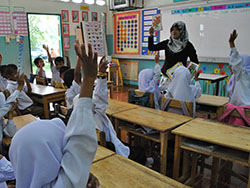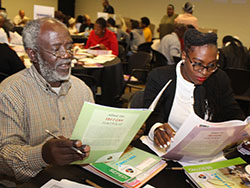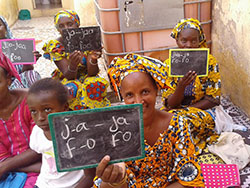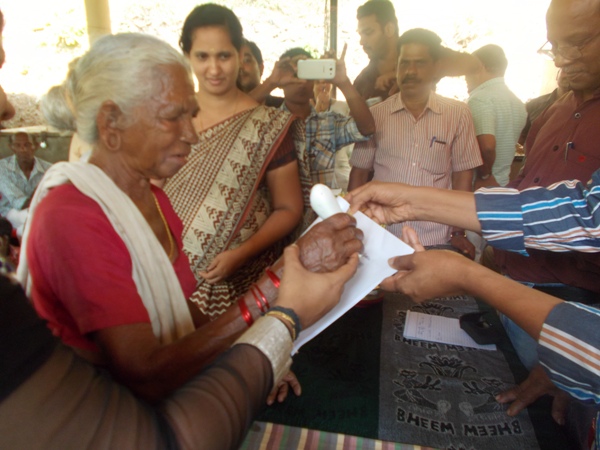2016 UNESCO International Literacy Prizes
This year marks the 50th anniversary of International Literacy Day (September 8), first proclaimed by the General Conference of UNESCO in 1966. The overarching theme of the 2016 event is ‘Reading the past, writing the future’.
UNESCO has worked to ensure that literacy remains a priority on national and international agendas, as well as to make available knowledge on effective literacy policies and programmes around the world. To promote excellence and innovation in the field of literacy, the organization recognizes the work of institutions, organizations and individuals whose efforts contribute to the promotion of dynamic literate societies. The thematic focus of the 2016 UNESCO International Literacy Prizes is ‘Innovation in Literacy’, which emphasizes the importance of innovation in literacy in the rapidly changing societies, economies and environments of the contemporary world. The award ceremony for UNESCO’s International Literacy Prizes honours programmes that have demonstrated innovative approaches in literacy in the context of Sustainable Development Goal 4, Education 2030 and the Agenda for Sustainable Development.
There are two distinct UNESCO International Literacy Prizes: the UNESCO Confucius Prize for Literacy (three awards) and the UNESCO King Sejong Prize (two awards). While the former focuses on literacy among adults in rural areas and out-of-school youth, particularly girls and women, the latter pays special attention to the development and use of mother-tongue literacy in education and training. To learn more about the UNESCO literacy awards, visit the webpage dedicated to the 50th anniversary of International Literacy Day.
The 2016 UNESCO International Literacy Prize laureates are:
| The Patani Malay-Thai Bi/Multilingual Education Project (Thailand), receiver of the UNESCO King Sejong Literacy Prize. | The Kha Ri Gude Mass Literacy Campaign (South Africa), receiver of the UNESCO Confucius Prize for Literacy. |
 |  |
| Initiated in 2008 by the Research Institute for Languages and Cultures of Asia at Mahidol University, the main objective of this bi/multilingual programme is to provide quality education in both Thai and Patani Malay for the children, families and communities of the Patani Malay minority. By preserving the local cultural and linguistic identity, the programme attempts to support the peace and reconciliation process in an area of Thailand that has witnessed internal conflict. | Implemented by the Department of Basic Education as an effort to promote universal access to education and improve adults’ literacy and numeracy skills across the country, this national initiative pays special attention to learners with special needs and disabilities. It employs an integrated approach that embeds literacy and basic skills with life skills training in the learners’ mother tongue. |
| The programme Books for Rural Areas of Vietnam (Vietnam), receiver of the UNESCO King Sejong Literacy Prize. | The National Education Programme for Illiterate Youth and Adults through ICTs (Senegal), receiver of the UNESCO Confucius Prize for Literacy. |
 |  |
| By establishing a system of libraries open to the public, the Center for Knowledge Assistance and Community Development aims to provide access to books and support the development of a strong reading culture in Viet Nam, as a contribution to the creation of an inclusive, creative and lifelong-learning society. Five different library models have been adopted to serve the specific needs of different groups, especially those in rural and mountainous areas and disadvantaged communities. | This national literacy programme is carried out by the Senegalese Directorate of Literacy and National Languages. It provides basic knowledge and life skills for people who have never been to school or who dropped out, in order to enhance their socio-economic inclusion and foster their civic participation. It promotes lifelong learning and education through the utilization of ICTs. |
| The programme Vocational and Skill Development for Sustainable Development (India), receiver of the UNESCO Confucius Prize for Literacy. | |
 | |
| The Institute of People’s Education, Jan Shiksha Sansthan Malappuram, provides literacy and vocational training to socio-economically disadvantaged and marginalized communities in the Malappuram district of the state of Kerala. Their programme embeds a literacy curriculum with other training opportunities adapted to local needs, resources and contexts. Demand-driven and relevant programming is developed through a Participatory Rural Appraisal process, which ensures that content is relevant to learners' livelihoods and socio-cultural realities, and deals with topics such as health, hygiene, agriculture and finance. |
Past UNESCO Literacy Prize Laureates
Along with other innovative programmes, the winners of UNESCO International Literacy Prizes have been featured on the UNESCO Effective Literacy and Numeracy Practices Database (LitBase) for the past several years. To learn more about past awardees, please click on the following links:
2015
- Open School Programme (Sri Lanka)
- Alphabetizing People Deprived of Liberty (Chile)
- Literacy in Local Language, a Springboard for Gender Equality (Mozambique)
- Action for Inclusive Education in Madagascar (Madagascar)
- Romano Barardo (Romanies the Gardeners) (Slovakia)
2014
- Basic Education for Youth and Adults Project (Ecuador)
- Empowerment of Women Living in Extreme Poverty in Burkina Faso (Burkina Faso)
- Literacy, Training and Integration of Women (Algeria)
- Networking as and Educational Project (Spain)
- Bridges to the Future Initiative (South Africa)
2013
- Ganokendra Model of Community Learning Centres (Bangladesh)
- Saakshar Bharat Mission (India)
- Mother-tongue Literacy in the Guera Region (Chad)
- I am Learning Your Tongue, You Are Learning My Tongue, We are Understanding Each Other, Tomorrow Belongs to Us (Cote d'Ivoire)
- National Literacy Programme in Nambia (Namibia)
2012
- Non-formal and Continuing Education (Bhutan)
- Sistema Interactivo Transformemos Educando (Colombia)
- Women’s Functional Literacy Programme (Niger)
- Innovative Literacy and Post-literacy Project: Means of Socio-economic Empowerment and Integration for Women (Morocco)
2011
- National Literacy Programme (Burundi)
- Room to Read
- Peace Management, Literacy, and Continuing Education through Night Market (Philippines)

